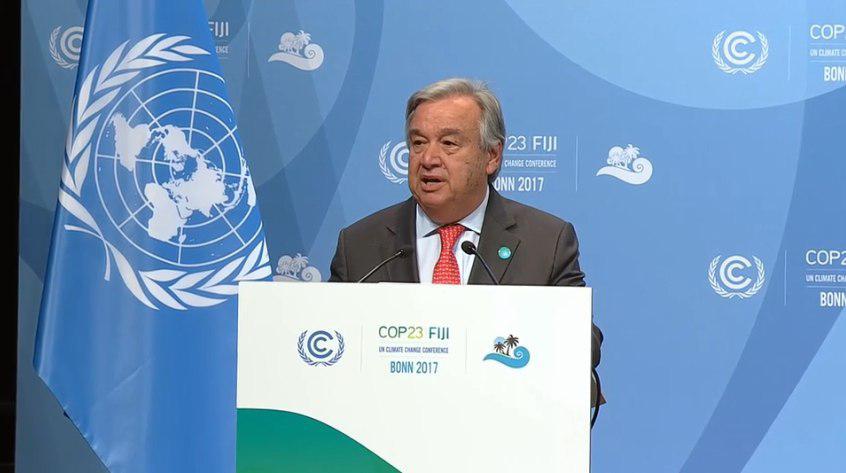
He made the remarks while addressing the UN climate change body’s annual negotiations (COP23) in Bonn, Germany.
'It is crucial for all countries to follow through on their Paris commitments. The agreement itself calls for raising ambition — and so I urge you to use the 2020 revision of the Nationally Determined Contributions to close the 2030 emissions gap,' Guteress stressed.
The full text of his speech follows:
It is fitting that this year’s conference of parties (on climate change, COP 23) is led by Fiji, a nation on the frontlines.
Last month I visited other small islands facing the impacts of a warming world: Antigua and Barbuda and Dominica. The hurricane damage was beyond belief. The catastrophic effects of climate change are upon us. Floods, fires, extreme storms and drought are growing in intensity and frequency.
Atmospheric levels of carbon dioxide are higher than they have been for 800,000 years. Climate change is the defining threat of our time. Our duty — to each other and to future generations — is to raise ambition.
We need to do more on five ambition action areas: emissions, adaptation, finance, partnerships and leadership.
First, reducing emissions
The latest UN Environment Programme Emissions Gap Report shows that current pledges will only deliver a third of what is needed to stay in the safety zones of the Paris Agreement.
The Global Carbon Project reported earlier this week that 2017 will see the first increase in CO2 emissions in three years.
The window of opportunity to meet the 2-degree target may close in 20 years or less. And we may have only five years to bend the emissions curve towards 1.5 degrees.
We need at least a further 25 per cent cut in emissions by 2020. Yet there are also encouraging signs of progress.
For years, many insisted that lowering emissions would stifle growth, and that high emissions were the unavoidable cost of progress. Today that dogma is dead. We are beginning to de-couple emissions from economic growth.
Massive economies such as China and India are on track to surpass their Paris pledges. Carbon markets are growing and merging. The Green Bond market is expanding.
It is crucial for all countries to follow through on their Paris commitments. The agreement itself calls for raising ambition — and so I urge you to use the 2020 revision of the Nationally Determined Contributions to close the 2030 emissions gap.
The second area for greater ambition is: Adaptation.
Mitigation is essential, but climate change is already upon us, and will only worsen in the short-term. It is essential that we adapt and that we strengthen resilience.
The Green Climate Fund can play a catalytic role on this, and I appeal to its members, especially donor nations, to bring this mechanism fully to life. I have also asked the UN system to promote adaptation and resilience efforts at the country level.
I commend the 2015 pledge by G7 nations to provide insurance against extreme weather events for 400 million more vulnerable people by 2020. And I welcome the announcement here in Bonn, led by the Government of Germany, to fast forward this ambition.
The insurance industry itself has long sounded the alarm about climate change. The industry is keen to promote coverage for people at risk — and it is pressing business and governments alike to figure climate shocks into their planning, policies and operations. I will facilitate these efforts.
Third, finance.
Greater ambition on emissions, adaptation and resilience is inextricably linked to funding. We need to mobilize the agreed 100-billion-dollars annually for developing countries.
Upholding this promise is essential for building confidence and trust. It is crucial for enabling all countries, but especially the most vulnerable, to face inevitable climate impacts and grow their economies cleanly.
In addition, markets can and must play a central role in financing a low-carbon, climate-resilient future. Yet markets need to be re-oriented away from the counter-productive and the short-term.
In 2016, an estimated 825 billion dollars were invested in fossil fuels and high-emissions sectors. We must stop making bets on an unsustainable future that will place savings and societies at risk.
Earlier this year, a report by the Organization for Economic Cooperation and Development (OECD) showed that bringing together the growth and climate agendas could add 1 per cent to average economic output in the G20 countries by 2021.
If we add the economic benefits of avoiding the devastation of climate change impacts, gross domestic product in 2050 would soar by 5 per cent. Infrastructure investment will be crucial.
The world should adopt a simple rule: If big infrastructure projects aren’t green, they shouldn’t be given the green light. Otherwise we will be locked into bad choices for decades to come.
**1394
Follow us on Twitter @IrnaEnglish
 solhkhabar | Peace International News Agency Peace International News Agency , Peace News , International Agency News of Peace
solhkhabar | Peace International News Agency Peace International News Agency , Peace News , International Agency News of Peace